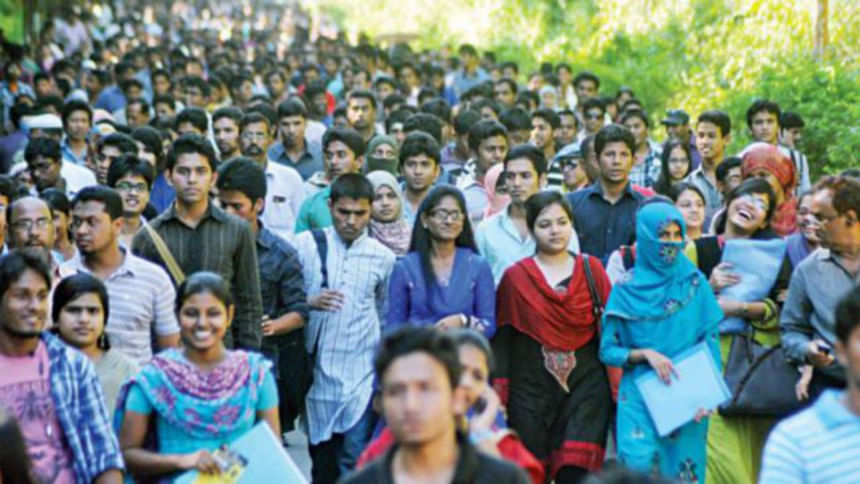What's limiting our potential?

Whenever there is a discussion about trade, investments, exports and economic growth, quite often much focus is placed upon infrastructure as the core challenge of our export growth. But is it the only hurdle?
There is no denying that we have a number of challenges in the area of infrastructure and trade logistics. Since the middle of last year the Chittagong port has been facing a tough situation as its activities were crippled by congestion and lack of handling equipment. Dhaka airport is also confronted with many challenges such as excessive delay in clearing the samples from customs and embargo by the European Union and a few other countries on direct cargo flights from Dhaka airport.
Lack of gas supply, industrial land for investment and deep sea port are some of the major tailbacks at the moment. The government is trying hard to overcome the infrastructural gap, but there is clearly no quick fix to these problems.
The good news is that there are a number of areas within our reach which can be explored to enhance our competitiveness and capability. Investing in human resources is one such area which is still largely untapped, particularly in mid-level management of our apparel industry which accounts for about 82 percent of the country's total export earnings. Bangladesh is living in an era of demographic dividend. Our literacy rate and access to information technology are increasing rapidly. And we have a huge pool of talented youth as well.
Industrialisation is the major platform to utilise our human resources. It's very unfortunate that we still lack in certain areas of professionalism—limiting our potential. The impact of such deficiencies will be felt severely by the industry in the near future when key factors like sustainability, innovation and automation will be playing a major role. The growing need for sustainability and optimisation in meeting customer demands will continue to drive our garment factories to become more adaptive and environment-friendly.
It's true that the apparel industry of Bangladesh has come a long way and we are now the second largest apparel-exporting country in the world with 6.36 percent of global market share. However, the industry still has a lot more potential to grow and thrive. Taking the apparel industry of Bangladesh to the next level greatly hinges upon ensuring qualified and skilled human resources in the middle managements of the factories. The following are some suggestions.
Fast reaction
One of the biggest challenges of the industry is the delay in response by factories as buyers raise queries. When a buyer places a query to Hong Kong, Tunisia and Bangladesh, they usually get complete feedback within one day from Hong Kong; for Tunisia it may take 2-3 days; whereas in the case of Bangladesh, the common scenario is that the merchandising team ends up with 5-10 new questions of their own. This results in immediate loss of opportunities and a poor impression in the long run. Time is perhaps the most important factor in the global fashion business and there is no scope to waste time through back-and-forth communication.
Better services
We can learn from the nations who have done well in the first phase of industrialisation and set examples of progress in terms of advanced sectors. For example, Hong Kong was one of the major global manufacturers and suppliers of apparel in the 70s and now it is the global hub of fashion business. Its gradual transformation in every aspect of professionalism—starting from technical skills to all other professional skills—sets them apart. So even though apparel is not one of the primary products made in Hong Kong anymore, they are still a major player in the fashion market. Bangladesh should be able to take inspiration from such success stories, take advantage of its human resources and transform the industry.
Soft skills
There is a serious lack in soft skills in presentation, negotiation, communication, etc., in our mid-level management, especially merchants. A confidence gap always prevails due to difficulties in communication between parties—which is why we often see expatriate professionals in our factories and in buyers' liaison offices. Expat professionals may be good for the transfer of knowledge to the local workforce. And we need them to bridge the cultural divide as well. But the important question to ask is, do the locals have the attitude to learn from them? Hong Kong too had expats; and it still does but to a lesser extent.
There is no doubt that the export sector, especially the garment industry, will be the key driver of our economic growth towards becoming a middle-income country by 2021. If we want our apparel industry to play its due role in Bangladesh's journey towards prosperity, there is no alternative but to equip our people with the best knowledge and skills. Our education system needs a complete overhaul, especially in the area of behavioural skills, to produce some of the best graduates who are going to play a vital role in global business and international trade.
Mostafiz Uddin is the managing director of Denim Expert Limited, and founder and CEO of Bangladesh Apparel Exchange (BAE).

 For all latest news, follow The Daily Star's Google News channel.
For all latest news, follow The Daily Star's Google News channel. 








Comments